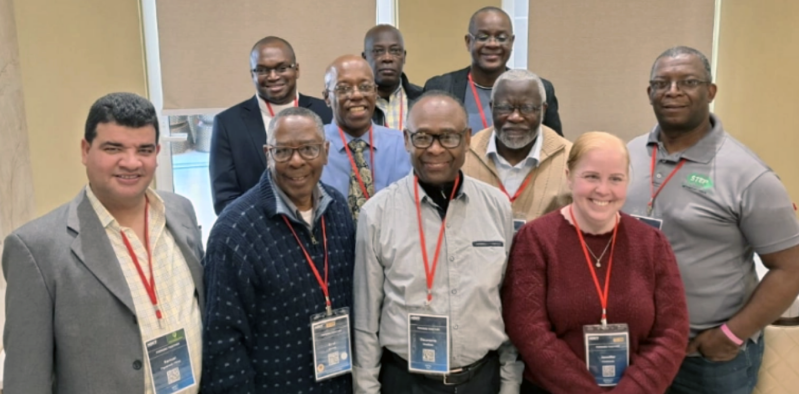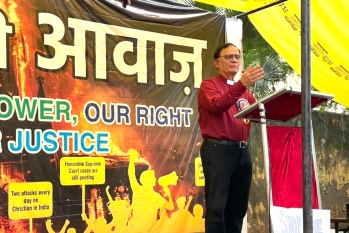
Many highly trained theological graduates are leaving the Caribbean due to economic and political challenges, contributing to a “brain drain” that affects local churches, according to Dr. Anthony Oliver, president of the Caribbean Evangelical Theological Association in Trinidad.
He believes a spiritual revival is needed to address both this exodus and the region’s high crime rates, as the Caribbean—known for its tourism—is also among the most violent in the Americas, with some of the worst murder rates on the continent. Nevertheless, Oliver is hopeful for the future and highlights the impact of theological institutions at great sacrifice.
Speaking to Christian Daily International during the International Council for Evangelical Theological Education (ICETE)’s 19th Global Consultation, held March 3-7, 2025, in Tirana, Albania, Oliver, who is also president of the Caribbean Graduate School of Theology in Jamaica, said theological institutions are experiencing a "turnover of some of their best people." He believes this exodus of theological graduates negatively impacts local church communities.
“We have that brain drain where a lot of those who are qualified at the master's level and a few who get qualified at the doctoral level, when they leave the country, they do not return to the country,” Oliver said.
However, he noted that graduates retain a sense of loyalty to their original theological college and “still want to contribute,” which is possible through the internet.
“One of the things they may be looking at is being able to offer the [theology] programs online so that even though a person might be in a diaspora, they can still contribute to teaching.”
This access-to-learning route faces challenges due to unstable political situations in some islands, such as Haiti, where gang violence is rampant, and Communist-run Cuba, where Wi-Fi connectivity struggles with frequent power outages caused by economic problems.
“You have issues where, because of that, things can't come into the country easily, a lot of distress, but they're pressing on and it's difficult,” Oliver said, speaking about communication challenges for outside education bodies reaching students in such scenarios.
Despite these difficulties, recent reports indicate that theological education schools are generally performing “very well” across the region. They are expanding with programs such as leadership courses and, notably, microcredentials—short courses designed to provide high-quality learning at a lower cost.
According to Oliver, microcredentials are popular among those who cannot afford longer, more expensive theological education programs, especially given factors such as the COVID-19 pandemic, rising costs of living, and localized economic issues, including the devaluation of the Jamaican dollar.
“But people are determined to be trained,” Oliver said. “We need to be more flexible in terms of short courses because not everybody wants to be a pastor, but sometimes people want to know the Bible better. And so what we've got to do is be creative.”
Microcredentialing has proven to be an efficient way to offer affordable access to theological education: “And so we are being impacted by that, and we want to be able to microcredential with high quality,” Oliver said. “And I believe we'll see that many more people in our churches will be enrolling in different programs. So the future looks bright.”
In Haiti, however, paying for theological education remains a challenge, as widespread violence disrupts the economy and limits employment opportunities.
“So they're doing the program, they're registering, but they cannot pay,” Oliver said, adding that sponsors in the U.S. and Canada have stepped in to cover fees for students.
“But it is very, very difficult. And we have some of the leaders so committed to theological education in a very, very volatile situation. One day can be very calm and peaceful, or two days [later] something happens and you're not sure—you have to stay home because your life could be at risk.”
In Jamaica and Trinidad and Tobago, there are numerous theological institutions and churches, but Oliver questions their impact on local Caribbean societies, where violence remains prevalent. He argues that theological education should not only be “cognitive or verbal” but should also lead to practical implementation and a “change in conduct.”
Inspired by historical revivals, such as the Azusa Street Revival of 1906-1908 and the Welsh Revival of 1904-1905, Oliver believes “a genuine revival” is necessary to address violence in the Caribbean, including gang activity in Haiti. Therefore, Christian witness on the islands is important.
“We've got to understand that we've got to live, we've got to be productive, to have your own business, respect people's property, respect people's lives, and so on and so forth. So I think our theology must impact our daily life because we have a lot of Christians.”
For Oliver, theological education should develop biblical character in students. He believes academic credentials must align with character development to ensure discipleship among church ministers is consistent with biblical teaching.
Oliver explained that the history of theological education in the Caribbean involved various denominations from the U.S., Canada, and Great Britain engaging in missions, sending missionaries and establishing small theological institutions that grew over time.
This resulted in a diverse range of church backgrounds, including Moravians, Baptists, Presbyterians, and Anglicans. Some of them have long histories, such as a Wesleyan school that served for more than 80 years, and theological schools not only serve English-speakers but also Spanish- and French-speaking populations.
“So it's interesting how some of these things have happened,” Oliver said. “People were revived and encouraged. They felt God's Spirit leading them beyond their Jerusalem into the utmost varsity of the Earth.”
Reflecting on the current state of theological education, Oliver emphasized the importance of gratitude for existing church leaders and institutions.
He recounted how those in the Pentecostal tradition trained pastors to an extent but “did not necessarily place a high emphasis on education” and relied instead on anointing and prayer, rather than formal academic training. However, some people have come to realize an imbalance between “being scholarly and depending upon the Spirit.”
In the past 25 years, Oliver has observed more Pentecostals seeking indepth academic studies with a first or master’s degrees, at schools such as at United Theological College in Jamaica or Jamaica Theological Seminary or the Caribbean Graduate School of Theology.
“So we want to say, ‘thank God’ for those who saw the vision to lift the standards,” Oliver said. “And what we are also seeing now is several of the Pentecostal schools are seeking accreditation. They're realizing that we need to lift our standards because to function legally in these territories, institutions need to register with the government.
“They don't need to always get accredited, but we have also been encouraging people to look at quality because accreditation is about quality.”
Theological graduates often pursue careers in education or counseling, primarily in government roles such as within ministries of education. Oliver points out the necessity of accreditation in these cases to ensure that qualifications are recognized.
“And so the issue of standards is whether the program you are offering is recognized by the national body. And so there has been that push to say, let's do what it takes, what is necessary to ensure that people, if they have to be bi-vocational, that they can get jobs in these fields and so forth,” he said.
Churches are making a significant impact through initiatives such as early childhood education, prison ministry, community services, and internship programs - “practical things.”
Oliver refrains from endorsing one theological institution over another in the region but remains “very encouraged by what's taking place in Cuba where there are 45 theological institutions.”
“Many of these are denominational, but Cuba is a pretty large country. And so some of these schools have 2,000 students. But they don't have economic power, so a lot of what is taking place there has to be subsidized, which is not the best way to do it, but people are doing it at great sacrifice.”
Oliver sees encouraging signs in the training of effective preachers and hopes for societal transformation in the Caribbean in the time ahead.
“We've got to have a genuine revival, and it's possible that we are about to get there, as though we are at some kind of a turning point. And so this is my hope—that we could collaborate and work together by the grace of God.
“2 Chronicles 7:14 says, ‘If my people, who are called by my name, will humble themselves and pray and seek my face and turn from their wicked ways, then I will hear from heaven, and I will forgive their sin and will heal their land.’
“And that's what we are saying,” he added.






